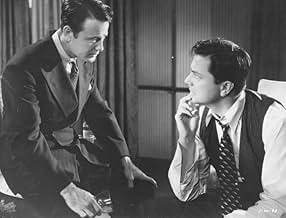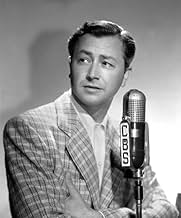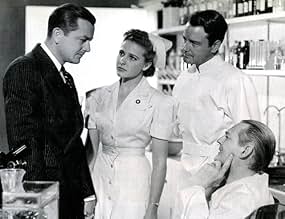Nurse Mary Lamont is excited about her brother's impending visit. The young man's strange behavior puzzles Dr. Kildare who believes he may be hiding a serious illness.Nurse Mary Lamont is excited about her brother's impending visit. The young man's strange behavior puzzles Dr. Kildare who believes he may be hiding a serious illness.Nurse Mary Lamont is excited about her brother's impending visit. The young man's strange behavior puzzles Dr. Kildare who believes he may be hiding a serious illness.
Horace McMahon
- Foghorn Murphy
- (as Horace MacMahon)
Eddie Acuff
- Clifford Genet - Window Cleaner
- (uncredited)
Ernie Alexander
- Assistant Bed Salesman
- (uncredited)
Charles Arnt
- Mr. Stubbins - Man with Pain
- (uncredited)
Tom Collins
- Doctor
- (uncredited)
Storyline
Did you know
- TriviaThe Medical Society of New York wrote a letter to the PCA protesting the way epilepsy was presented in the movie. They objected to the claims that epilepsy is inherited, that it is curable and that it leads to insanity.
- GoofsWhen Dr Gillispie finishes reading the note from Mary, he says "Fine girl, that Mary" and puts the note on his desk with a thump, and with the next cut, it immediately appears in Dr. Kildare's hands.
- Quotes
Douglas 'Doug' Lamont: [on a prescribed treatment plan] Suppose I decide it isn't worth it?
Dr. James 'Jimmy' Kildare: Well, then you face a gradual disintegration of the brain, probable insanity, and a wretched living death.
- ConnectionsFollowed by The People vs. Dr. Kildare (1941)
Featured review
Dr. K, Dr. Gillespie, and nurse Mary are all involved in "Dr. Kildare's Crisis," a 1940 "Dr. Kildare" film which stars regulars Lew Ayres as Kildare, Laraine Day as Mary, Lionel Barrymore as Dr. Gillepsie, Alma Kruger as the nursing supervisor. Robert Young appears as Mary's brother Doug. Kildare and Mary are planning their wedding when Douglas comes to visit. He has a plan to help unskilled labor become skilled, and needs the support of one of Kildare's grateful ex-patients.
Unfortunately it's downhill from there, due to a very weak script. Kildare, without examining Mary's brother, decides he has epilepsy on the basis that Douglas sometimes seems to hear noises no one else hears. This makes Mary afraid to marry Kildare for fear of having him end up with a sick wife or epileptic children. She becomes hysterical and wants to return home with her brother. Well, this plot line is so pathetic that the New York Medical Society wrote a letter in protest about the way epilepsy is treated in the film - that it's curable, that it can be inherited, and that it can lead to insanity. Also, how could Mary, a trained nurse, go so crazy and insist on dumping Kildare, whom she's been chasing for years? Really preposterous behavior on the part of the characters. The audience knows them by now and it's pretty bewildering.
The series would be over in 1942 and become the "Dr. Gillespie" series, which retained Barrymore and Alma Kruger. Lew Ayres was persona non grata for being a conscientious objector in World War II, though he did work on the front lines as a medic. MGM didn't care, they just wanted to be rid of him. When he returned from the war, the handsome Ayres did some of his best work, receiving an Oscar nomination for "Johnny Belinda," and continuing his career until 1994. Laraine Day, though MGM never seemed to know what to do with her,(happily, she was loaned out a lot) is lovely as Mary, and of course, due to her involvement with Kildare, Mary becomes a casualty in this series. Dr. Gillespie, starring in his own movie series, would mellow. Both the Kildare and Gillespie series were very popular. It's a shame that this film seems so out of place.
Unfortunately it's downhill from there, due to a very weak script. Kildare, without examining Mary's brother, decides he has epilepsy on the basis that Douglas sometimes seems to hear noises no one else hears. This makes Mary afraid to marry Kildare for fear of having him end up with a sick wife or epileptic children. She becomes hysterical and wants to return home with her brother. Well, this plot line is so pathetic that the New York Medical Society wrote a letter in protest about the way epilepsy is treated in the film - that it's curable, that it can be inherited, and that it can lead to insanity. Also, how could Mary, a trained nurse, go so crazy and insist on dumping Kildare, whom she's been chasing for years? Really preposterous behavior on the part of the characters. The audience knows them by now and it's pretty bewildering.
The series would be over in 1942 and become the "Dr. Gillespie" series, which retained Barrymore and Alma Kruger. Lew Ayres was persona non grata for being a conscientious objector in World War II, though he did work on the front lines as a medic. MGM didn't care, they just wanted to be rid of him. When he returned from the war, the handsome Ayres did some of his best work, receiving an Oscar nomination for "Johnny Belinda," and continuing his career until 1994. Laraine Day, though MGM never seemed to know what to do with her,(happily, she was loaned out a lot) is lovely as Mary, and of course, due to her involvement with Kildare, Mary becomes a casualty in this series. Dr. Gillespie, starring in his own movie series, would mellow. Both the Kildare and Gillespie series were very popular. It's a shame that this film seems so out of place.
Details
- Runtime1 hour 15 minutes
- Color
- Aspect ratio
- 1.37 : 1
Contribute to this page
Suggest an edit or add missing content






































